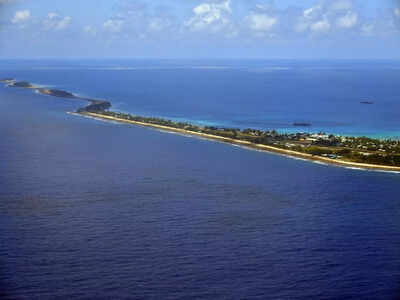ARTICLE AD BOX

Tuvalu, a remote island country in the central Pacific Ocean, is set to make history, though not in a way anyone hoped. Facing the existential threat of rising sea levels, it is preparing to carry out the world’s first planned relocation of its entire population.
Multiple studies predict that much of Tuvalu’s land could be underwater within 25 years, forcing its 11,000 citizens to migrate for survival.
A nation on the frontline of climate change
Tuvalu is made up of nine low-lying coral islands and atolls, with an average elevation of just two meters above sea level. This geography leaves it acutely vulnerable to flooding, storm surges, and sea-level rise caused by global warming. Scientists estimate the nation could become uninhabitable within the next 80 years.
Alarmingly, two of its nine atolls are already almost completely submerged.The threat is accelerating. According to NASA’s Sea Level Change Team, sea levels in Tuvalu were 15 centimeters higher in 2023 compared to 30 years ago. At this pace, most of Tuvalu’s land and infrastructure could be lost by 2050.

The Falepili Union Treaty
In 2023, Tuvalu signed the Falepili Union Treaty with Australia, a landmark agreement offering Tuvaluans a secure future.
Under this treaty, 280 citizens each year will be granted permanent residency in Australia, with access to housing, healthcare, education, and employment.Read more: 7 caves of India with great historic valueThe program opened its first ballot in July 2025 and received nearly 9,000 registrations for just 280 available places, a clear sign of the urgency felt by Tuvalu’s people. The first group of migrants will be selected by lottery and are expected to begin resettling in Australia later this year.
If migration continues at this rate, up to 40% of Tuvalu’s population could be relocated within a decade, supplemented by other pathways to countries like New Zealand.The migration plan isn’t solely about physical relocation; it is also about preserving Tuvalu’s heritage. In 2022, the government announced its ambition to become the world’s first “digital nation.” This includes 3D-scanning islands, digitizing government services, and amending its constitution to recognize Tuvalu as a virtual state.
The idea is to safeguard the nation’s cultural and political identity even if its physical territory disappears beneath the ocean.Read more: 9 purple animals that actually exist and where to find themTuvalu’s plight is a stark reminder that climate change is not a distant threat but a current reality. NASA reports that global sea levels have doubled their rate of increase since 1993, with some regions — like the Gulf of Mexico — rising three times faster than the global average.
Low-lying coastal areas in the United States, including parts of Florida, Louisiana, Texas, Alabama, and Mississippi, also face severe risks.Australia’s Foreign Minister Penny Wong has called the treaty an opportunity for Tuvaluans to move “with dignity as climate impacts worsen.” Tuvalu’s Prime Minister Feleti Teo has urged the global community to create frameworks that protect nations on the brink of climate-induced extinction.If projections hold true, Tuvalu may become the first country in history to be completely consumed by rising seas — a symbol of the human cost of climate change and a warning to coastal communities worldwide.



.png)
.png)
.png)
















 22 hours ago
7
22 hours ago
7









 English (US) ·
English (US) ·